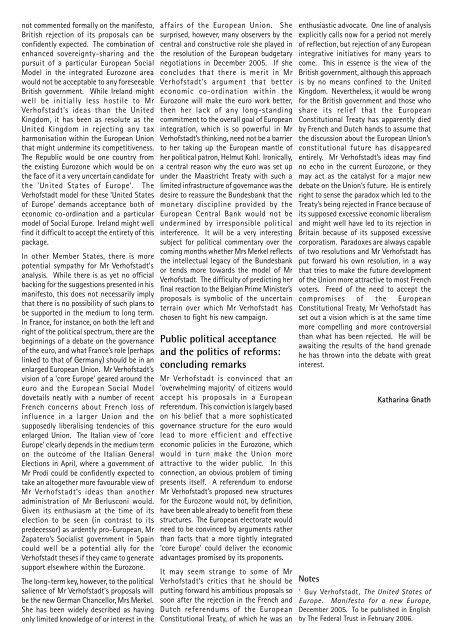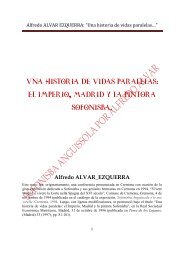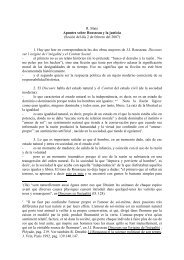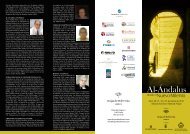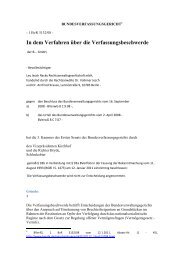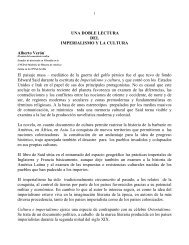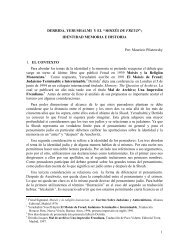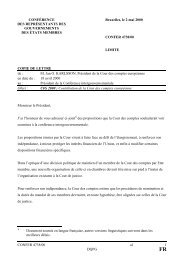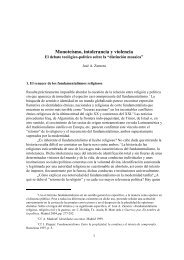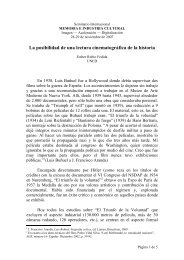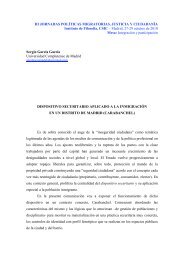Guy Verhofstadt and 'The United States of Europe'
Guy Verhofstadt and 'The United States of Europe'
Guy Verhofstadt and 'The United States of Europe'
- No tags were found...
Create successful ePaper yourself
Turn your PDF publications into a flip-book with our unique Google optimized e-Paper software.
not commented formally on the manifesto,British rejection <strong>of</strong> its proposals can beconfidently expected. The combination <strong>of</strong>enhanced sovereignty-sharing <strong>and</strong> thepursuit <strong>of</strong> a particular European SocialModel in the integrated Eurozone areawould not be acceptable to any foreseeableBritish government. While Irel<strong>and</strong> mightwell be initially less hostile to Mr<strong>Verh<strong>of</strong>stadt</strong>’s ideas than the <strong>United</strong>Kingdom, it has been as resolute as the<strong>United</strong> Kingdom in rejecting any taxharmonisation within the European Unionthat might undermine its competitiveness.The Republic would be one country fromthe existing Eurozone which would be onthe face <strong>of</strong> it a very uncertain c<strong>and</strong>idate forthe '<strong>United</strong> <strong>States</strong> <strong>of</strong> <strong>Europe'</strong>. The<strong>Verh<strong>of</strong>stadt</strong> model for these '<strong>United</strong> <strong>States</strong><strong>of</strong> <strong>Europe'</strong> dem<strong>and</strong>s acceptance both <strong>of</strong>economic co-ordination <strong>and</strong> a particularmodel <strong>of</strong> Social Europe. Irel<strong>and</strong> might wellfind it difficult to accept the entirety <strong>of</strong> thispackage.In other Member <strong>States</strong>, there is morepotential sympathy for Mr <strong>Verh<strong>of</strong>stadt</strong>'sanalysis. While there is as yet no <strong>of</strong>ficialbacking for the suggestions presented in hismanifesto, this does not necessarily implythat there is no possibility <strong>of</strong> such plans tobe supported in the medium to long term.In France, for instance, on both the left <strong>and</strong>right <strong>of</strong> the political spectrum, there are thebeginnings <strong>of</strong> a debate on the governance<strong>of</strong> the euro, <strong>and</strong> what France’s role (perhapslinked to that <strong>of</strong> Germany) should be in anenlarged European Union. Mr <strong>Verh<strong>of</strong>stadt</strong>’svision <strong>of</strong> a 'core <strong>Europe'</strong> geared around theeuro <strong>and</strong> the European Social Modeldovetails neatly with a number <strong>of</strong> recentFrench concerns about French loss <strong>of</strong>influence in a larger Union <strong>and</strong> thesupposedly liberalising tendencies <strong>of</strong> thisenlarged Union. The Italian view <strong>of</strong> 'core<strong>Europe'</strong> clearly depends in the medium termon the outcome <strong>of</strong> the Italian GeneralElections in April, where a government <strong>of</strong>Mr Prodi could be confidently expected totake an altogether more favourable view <strong>of</strong>Mr <strong>Verh<strong>of</strong>stadt</strong>’s ideas than anotheradministration <strong>of</strong> Mr Berlusconi would.Given its enthusiasm at the time <strong>of</strong> itselection to be seen (in contrast to itspredecessor) as ardently pro-European, MrZapatero’s Socialist government in Spaincould well be a potential ally for the<strong>Verh<strong>of</strong>stadt</strong> theses if they came to generatesupport elsewhere within the Eurozone.The long-term key, however, to the politicalsalience <strong>of</strong> Mr <strong>Verh<strong>of</strong>stadt</strong>'s proposals willbe the new German Chancellor, Mrs Merkel.She has been widely described as havingonly limited knowledge <strong>of</strong> or interest in theaffairs <strong>of</strong> the European Union. Shesurprised, however, many observers by thecentral <strong>and</strong> constructive role she played inthe resolution <strong>of</strong> the European budgetarynegotiations in December 2005. If sheconcludes that there is merit in Mr<strong>Verh<strong>of</strong>stadt</strong>’s argument that bettereconomic co-ordination within theEurozone will make the euro work better,then her lack <strong>of</strong> any long-st<strong>and</strong>ingcommitment to the overall goal <strong>of</strong> Europeanintegration, which is so powerful in Mr<strong>Verh<strong>of</strong>stadt</strong>’s thinking, need not be a barrierto her taking up the European mantle <strong>of</strong>her political patron, Helmut Kohl. Ironically,a central reason why the euro was set upunder the Maastricht Treaty with such alimited infrastructure <strong>of</strong> governance was thedesire to reassure the Bundesbank that themonetary discipline provided by theEuropean Central Bank would not beundermined by irresponsible politicalinterference. It will be a very interestingsubject for political commentary over thecoming months whether Mrs Merkel reflectsthe intellectual legacy <strong>of</strong> the Bundesbankor tends more towards the model <strong>of</strong> Mr<strong>Verh<strong>of</strong>stadt</strong>. The difficulty <strong>of</strong> predicting herfinal reaction to the Belgian Prime Minister’sproposals is symbolic <strong>of</strong> the uncertainterrain over which Mr <strong>Verh<strong>of</strong>stadt</strong> haschosen to fight his new campaign.Public political acceptance<strong>and</strong> the politics <strong>of</strong> reforms:concluding remarksMr <strong>Verh<strong>of</strong>stadt</strong> is convinced that an'overwhelming majority' <strong>of</strong> citizens wouldaccept his proposals in a Europeanreferendum. This conviction is largely basedon his belief that a more sophisticatedgovernance structure for the euro wouldlead to more efficient <strong>and</strong> effectiveeconomic policies in the Eurozone, whichwould in turn make the Union moreattractive to the wider public. In thisconnection, an obvious problem <strong>of</strong> timingpresents itself. A referendum to endorseMr <strong>Verh<strong>of</strong>stadt</strong>’s proposed new structuresfor the Eurozone would not, by definition,have been able already to benefit from thesestructures. The European electorate wouldneed to be convinced by arguments ratherthan facts that a more tightly integrated'core <strong>Europe'</strong> could deliver the economicadvantages promised by its proponents.It may seem strange to some <strong>of</strong> Mr<strong>Verh<strong>of</strong>stadt</strong>’s critics that he should beputting forward his ambitious proposals sosoon after the rejection in the French <strong>and</strong>Dutch referendums <strong>of</strong> the EuropeanConstitutional Treaty, <strong>of</strong> which he was anenthusiastic advocate. One line <strong>of</strong> analysisexplicitly calls now for a period not merely<strong>of</strong> reflection, but rejection <strong>of</strong> any Europeanintegrative initiatives for many years tocome. This in essence is the view <strong>of</strong> theBritish government, although this approachis by no means confined to the <strong>United</strong>Kingdom. Nevertheless, it would be wrongfor the British government <strong>and</strong> those whoshare its relief that the EuropeanConstitutional Treaty has apparently diedby French <strong>and</strong> Dutch h<strong>and</strong>s to assume thatthe discussion about the European Union’sconstitutional future has disappearedentirely. Mr <strong>Verh<strong>of</strong>stadt</strong>’s ideas may findno echo in the current Eurozone, or theymay act as the catalyst for a major newdebate on the Union’s future. He is entirelyright to sense the paradox which led to theTreaty’s being rejected in France because <strong>of</strong>its supposed excessive economic liberalism<strong>and</strong> might well have led to its rejection inBritain because <strong>of</strong> its supposed excessivecorporatism. Paradoxes are always capable<strong>of</strong> two resolutions <strong>and</strong> Mr <strong>Verh<strong>of</strong>stadt</strong> hasput forward his own resolution, in a waythat tries to make the future development<strong>of</strong> the Union more attractive to most Frenchvoters. Freed <strong>of</strong> the need to accept thecompromises <strong>of</strong> the EuropeanConstitutional Treaty, Mr <strong>Verh<strong>of</strong>stadt</strong> hasset out a vision which is at the same timemore compelling <strong>and</strong> more controversialthan what has been rejected. He will beawaiting the results <strong>of</strong> the h<strong>and</strong> grenadehe has thrown into the debate with greatinterest.NotesKatharina Gnath1<strong>Guy</strong> <strong>Verh<strong>of</strong>stadt</strong>, The <strong>United</strong> <strong>States</strong> <strong>of</strong>Europe. Manifesto for a new Europe,December 2005. To be published in Englishby The Federal Trust in February 2006.


